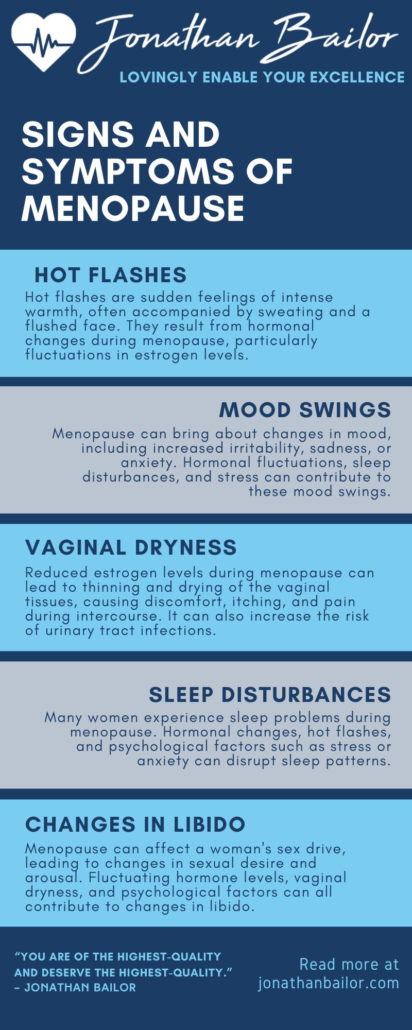10 Tips to Ease Hormonal Fluctuations During Menopause
Embarking on the journey through menopause can feel like setting sail on uncharted waters, but fear not, for this Hormone Health Guide with Jonathan Bailor offers invaluable insights explicitly curated for you, the intrepid traveler navigating the ebbs and flows of this transformative phase of life.
As the sun sets on the fertile years and rises on a new chapter, it’s natural to encounter choppy seas and uncertain horizons. Yet, armed with knowledge and wisdom, you possess the power to navigate these waters with confidence and grace.
Each tip presented here is a beacon of light, illuminating the path to hormonal balance and well-being. From dietary adjustments to stress management techniques, these strategies have been carefully selected to empower you on your journey.
But remember, knowledge is meant to be shared. As you embark on your voyage through menopause, consider extending a hand to others who may benefit from these insights. Together, we can create a ripple effect of support and understanding that spans far and wide.
So, with courage in your heart and these ten tips as your compass, set sail towards smoother waters. Your journey through menopause may be marked by twists and turns, but with each passing wave, know that you are not alone.
Stay tuned as we set out on this adventure together, exploring each tip in depth and discovering the transformative power of hormonal balance. Smooth sailing awaits, and with each passing day, may you find greater peace and harmony amidst the tides of change.
What is Menopause?
Menopause marks the cessation of menstruation, typically occurring in women around the age of 50. It is a natural biological process that signifies the end of the reproductive years. During this time, the ovaries gradually decrease hormone production, leading to various physical and emotional changes. Symptoms of menopause may include severe hot flashes, mood swings, and vaginal dryness. While menopause is a universal experience for women, the intensity and duration of symptoms can vary widely.
Understanding menopause as a natural transition rather than a medical condition can help women navigate this phase with greater ease and acceptance.
The Stages of Menopause
Navigating the stages of menopause is akin to embarking on a multi-faceted journey, each phase characterized by distinct hormonal shifts and physiological changes. Understanding these stages can empower women to anticipate and manage the transitions with greater confidence and clarity.
Perimenopause: The Prelude to Change
Perimenopause marks the onset of hormonal fluctuations and typically begins in a woman’s 40s, although it can start earlier or later for some. During perimenopause, estrogen levels fluctuate unpredictably, leading to irregular menstrual cycles and perimenopausal symptoms such as hot flashes, mood swings, and sleep disturbances. While fertility declines, it is still possible to conceive, making contraception essential for women who wish to avoid pregnancy.
Perimenopause can last for several years before transitioning into full menopause.
Menopause: The Culmination of Change
Menopause officially begins when a woman has not had a menstrual period for 12 consecutive months, typically occurring around the age of 50. Premature menopause, also called early menopause, can occur much earlier than is typical for this stage. At this point, progesterone and estrogen production have significantly decreased, leading to the cessation of menstruation and the onset of common menopause symptoms like hot flashes, night sweats, and vaginal dryness.
While menopause marks the end of the reproductive years, it also signifies a new chapter in a woman’s life, free from the constraints of menstruation and fertility.
Postmenopause: Embracing the New Normal
Postmenopause encompasses the years following menopause and lasts for the remainder of a woman’s life. During this stage, hormone levels stabilize at lower levels, and many menopausal symptoms diminish or disappear entirely. However, the risk of certain health conditions, such as osteoporosis and cardiovascular disease, may increase due to hormonal changes. Maintaining a healthy lifestyle, including regular exercise and a balanced diet, becomes paramount for supporting overall well-being and mitigating these risks.
Embracing postmenopause as a time of self-discovery and empowerment can pave the way for a fulfilling and vibrant life beyond menopause.

Feeling Better Is Priceless, That's Why We Don't Put A Price On It!
“It’s Like A Free and Medically Valid Version of Noom and Weight Watchers Online”
~ Dr. Doctor Matthew Oleshiak, MD
Click the 'LEARN MORE' button below for free lifetime access to the fast fix program developed by Jonathan and top Ivy League Medical Doctors
LEARN MOREP.S. It's not a free trial. It's not part of the program for free. The entire program is free, forever, for real! No credit card needed.
10 Strategies to Ease Hormonal Fluctuations During Menopause
Navigating the hormonal fluctuations of menopause can be challenging, but there are strategies to help alleviate symptoms and promote overall well-being. These tips are designed to empower women to take control of their health and navigate this transition with grace and confidence.
1. Prioritize Nutrient-Dense Foods
Focus on incorporating plenty of fruits, vegetables, lean proteins, and healthy fats into your diet. These foods provide essential vitamins, minerals, and antioxidants that support hormone balance and overall health.
Limiting processed foods, sugar, and caffeine can also help reduce inflammation and stabilize blood sugar levels, which can alleviate symptoms like hot flashes and mood swings.
2. Stay Hydrated
Proper hydration is essential for maintaining hormone balance and supporting overall health. Aim to drink plenty of water throughout the day, and consider adding herbal teas or infused water for variety.
Avoid excessive alcohol consumption, as it can disrupt hormone levels and exacerbate symptoms like hot flashes and night sweats.
3. Manage Stress
Chronic stress can wreak havoc on hormone levels and exacerbate menopausal symptoms. Incorporate stress-reducing practices into your daily routine, such as meditation, deep breathing exercises, yoga, or spending time in nature.
Prioritizing self-care and setting boundaries can also help reduce stress and promote emotional well-being.
4. Get Regular Exercise
Regular physical activity has numerous benefits for hormone balance and overall health. Strive for a combination of cardiovascular exercise, strength training, and flexibility exercises to support bone health, maintain muscle mass, and alleviate stress.
Find activities you enjoy and make them a regular part of your routine for maximum benefits.
5. Prioritize Sleep
Quality sleep is essential for hormone balance and overall well-being, but many women experience sleep disturbances during menopause. Create a relaxing bedtime routine, limit screen time before bed, and create a comfortable sleep environment to promote restful sleep.
If sleep disturbances persist, consult with a healthcare professional for personalized recommendations.

6. Consider Hormone Therapy
Hormone therapy, including estrogen therapy and combination estrogen-progestin therapy, can be effective in managing menopausal symptoms for some women.
However, it’s important to discuss the potential risks and benefits with a healthcare provider and explore other options before deciding.
7. Explore Natural Remedies
Many women find relief from menopausal symptoms through natural remedies such as herbal supplements, acupuncture, or bio-identical hormone therapy.
While not all remedies may be effective for everyone, exploring these options under the guidance of a qualified healthcare provider can help you identify what works best for you.
8. Supportive Supplements
Certain supplements, such as vitamin D, calcium, magnesium, and omega-3 fatty acids, may support hormone balance and alleviate menopausal symptoms.
Consult a healthcare provider to determine if supplements are appropriate for you and discuss proper dosages.
9. Maintain a Healthy Weight
Excess weight can exacerbate menopausal symptoms and increase the risk of chronic health conditions such as heart disease and diabetes.
Focus on maintaining a healthy weight through a balanced diet and regular exercise, and consult with a healthcare provider for personalized recommendations.
10. Seek Support
Menopause is a significant life transition, and seeking support from friends, family, and healthcare providers is essential. Joining a support group or seeking counseling can provide valuable emotional support and practical guidance for navigating this journey with confidence and resilience.
Remember, you’re not alone, and resources are available to help you thrive during this phase of life.

Hormone Health FAQ
Q1: What are hormones, and why are they important for health?
A1: Hormones are chemical messengers produced by various glands in the body, such as the thyroid, adrenal glands, and ovaries. They play a crucial role in regulating numerous bodily functions, including metabolism, reproduction, mood, and sleep. When hormone levels are balanced, the body functions optimally. However, imbalances can lead to a wide range of symptoms and health issues.
Q2: What are some common signs of hormonal imbalances?
A2: Common signs of hormonal imbalances include irregular menstrual cycles, weight gain or difficulty losing weight, fatigue, mood swings, sleep disturbances, and changes in libido. Women may also experience symptoms such as hot flashes, night sweats, vaginal dryness, and difficulty concentrating. Men may experience symptoms such as erectile dysfunction, decreased muscle mass, and hair loss.
Q3: What factors can contribute to hormonal imbalances?
A3: Hormonal imbalances can be caused by a variety of factors, including stress, poor diet, lack of exercise, certain medications, chronic illnesses, and environmental toxins. Aging also plays a role, as hormone levels naturally decline with age. Additionally, conditions such as polycystic ovary syndrome (PCOS), thyroid disorders, and diabetes can disrupt hormone levels and lead to imbalances.
Q4: How can hormonal imbalances be diagnosed and treated?
A4: Hormonal imbalances are typically diagnosed through blood tests that measure hormone levels. Depending on the specific imbalance and underlying cause, treatment may involve lifestyle modifications, such as dietary changes, regular exercise, stress management techniques, and adequate sleep. In some cases, hormone replacement therapy (HRT) or other medications may be prescribed to restore balance.
Working closely with a healthcare provider to determine the most appropriate treatment plan based on individual needs and circumstances is essential.
Q5: What steps can be taken to support hormone health?
A5: Supporting hormone health involves adopting a holistic approach that addresses diet, exercise, stress management, and environmental factors. A balanced diet rich in whole foods, including plenty of fruits, vegetables, lean proteins, and healthy fats, can help support hormone balance. Regular exercise, adequate sleep, and stress reduction techniques such as meditation and deep breathing exercises can also play a significant role. Additionally, avoiding exposure to environmental toxins, such as pesticides and endocrine-disrupting chemicals in certain plastics, can help protect hormone health.
Consulting with a healthcare provider for personalized recommendations and guidance is key to maintaining optimal hormone balance and overall well-being.
Empower Yourself with Hormonal Fluctuations Knowledge
As you navigate the complexities of hormonal fluctuations during menopause, remember that knowledge is power. By understanding the factors contributing to these changes and implementing proactive strategies to ease symptoms, you can take control of your health journey with confidence and resilience.
Share these insights with your friends and family who may also be navigating menopause, spreading awareness and support for one another. Together, we can empower each other to prioritize hormonal health during this transformative phase of life.
So, hit that share button, and let’s ignite a wave of support and understanding across social media and email platforms.
Feeling Better Is Priceless, That's Why We Don't Put A Price On It!
“It’s Like A Free and Medically Valid Version of Noom and Weight Watchers Online”
~ Dr. Doctor Matthew Oleshiak, MD
Click the 'LEARN MORE' button below for free lifetime access to the fast fix program developed by Jonathan and top Ivy League Medical Doctors
LEARN MOREP.S. It's not a free trial. It's not part of the program for free. The entire program is free, forever, for real! No credit card needed.




